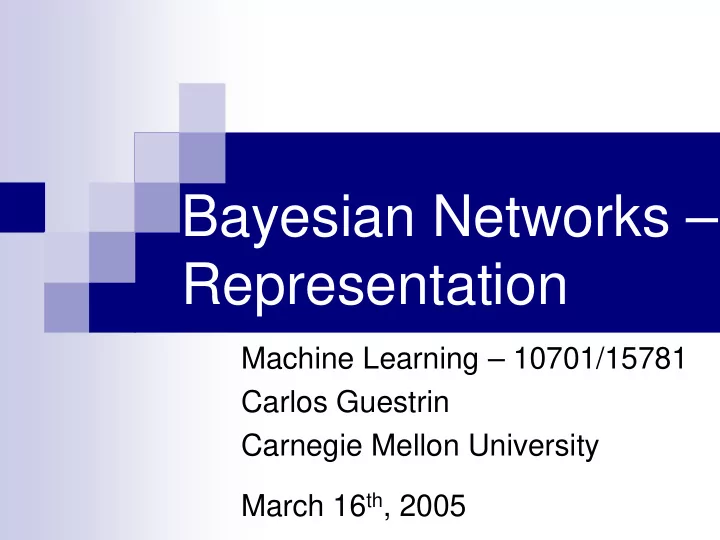

Bayesian Networks – Representation Machine Learning – 10701/15781 Carlos Guestrin Carnegie Mellon University March 16 th , 2005
Handwriting recognition Character recognition, e.g., kernel SVMs r r r r r c r a c c z b
Webpage classification Company home page vs Personal home page vs Univeristy home page vs …
Handwriting recognition 2
Webpage classification 2
Today – Bayesian networks � One of the most exciting advancements in statistical AI in the last 10-15 years � Generalizes naïve Bayes and logistic regression classifiers � Compact representation for exponentially-large probability distributions � Exploit conditional independencies
Causal structure � Suppose we know the following: � The flu causes sinus inflammation � Allergies cause sinus inflammation � Sinus inflammation causes a runny nose � Sinus inflammation causes headaches � How are these connected?
Possible queries � Inference Flu Allergy � Most probable Sinus explanation Nose Headache � Active data collection
Car starts BN � 18 binary attributes � Inference � P(BatteryAge|Starts=f) � 2 18 terms, why so fast? � Not impressed? � HailFinder BN – more than 3 54 = 58149737003040059690390169 terms
Factored joint distribution - Preview Flu Allergy Sinus Nose Headache
Number of parameters Nose Allergy Sinus Headache Flu
Key: Independence assumptions Flu Allergy Sinus Nose Headache Knowing sinus separates the variables from each other
(Marginal) Independence � Flu and Allergy are (marginally) independent Flu = t Flu = f � More Generally: Allergy = t Allergy = f Flu = t Flu = f Allergy = t Allergy = f
Conditional independence � Flu and Headache are not (marginally) independent � Flu and Headache are independent given Sinus infection � More Generally:
The independence assumption Flu Allergy Local Markov Assumption: A variable X is independent Sinus of its non-descendants given its parents Nose Headache
Local Markov Assumption: Explaining away A variable X is independent of its non-descendants given its parents Flu Allergy Sinus Nose Headache
Naïve Bayes revisited Local Markov Assumption: A variable X is independent of its non-descendants given its parents
What about probabilities? Conditional probability tables (CPTs) Flu Allergy Sinus Nose Headache
Joint distribution Flu Allergy Sinus Nose Headache Why can we decompose? Markov Assumption!
Real Bayesian networks applications � Diagnosis of lymph node disease � Speech recognition � Microsoft office and Windows � http://www.research.microsoft.com/research/dtg/ � Study Human genome � Robot mapping � Robots to identify meteorites to study � Modeling fMRI data � Anomaly detection � Fault dianosis � Modeling sensor network data
A general Bayes net � Set of random variables � Directed acyclic graph � Encodes independence assumptions � CPTs � Joint distribution:
Another example � Variables: � B – Burglar � E – Earthquake � A – Burglar alarm � N – Neighbor calls � R – Radio report � Both burglars and earthquakes can set off the alarm � If the alarm sounds, a neighbor may call � An earthquake may be announced on the radio
Another example – Building the BN � B – Burglar � E – Earthquake � A – Burglar alarm � N – Neighbor calls � R – Radio report
Defining a BN � Given a set of variables and conditional independence assumptions � Choose an ordering on variables, e.g., X 1 , …, X n � For i = 1 to n � Add X i to the network � Define parents of X i , Pa Xi , in graph as the minimal subset of {X 1 ,…,X i-1 } such that local Markov assumption holds – X i independent of rest of {X 1 ,…,X i-1 }, given parents Pa Xi � Define/learn CPT – P(X i | Pa Xi )
How many parameters in a BN? � Discrete variables X 1 , …, X n � Graph � Defines parents of X i , Pa Xi � CPTs – P(X i | Pa Xi )
We may not know conditional Defining a BN 2 independence assumptions and even variables � Given a set of variables and conditional independence assumptions � Choose an ordering on variables, e.g., X 1 , …, X n � For i = 1 to n There are good orderings and bad � Add X i to the network ones – A bad ordering may need more parents per variable → must � Define parents of X i , Pa Xi , in graph as the minimal learn more parameters subset of {X 1 ,…,X i-1 } such that local Markov assumption holds – X i independent of rest of {X 1 ,…,X i-1 }, given parents Pa Xi � Define/learn CPT – P(X i | Pa Xi ) How???
Learning the CPTs For each discrete variable X i Data x (1) … x (m)
Learning Bayes nets Known structure Unknown structure Fully observable data Missing data
Queries in Bayes nets � Given BN, find: � Probability of X given some evidence, P(X|e) � Most probable explanation, max x1,…,xn P(x 1 ,…,x n | e) � Most informative query � Learn more about these next class
What you need to know � Bayesian networks � A compact representation for large probability distributions � Not an algorithm � Semantics of a BN � Conditional independence assumptions � Representation � Variables � Graph � CPTs � Why BNs are useful � Learning CPTs from fully observable data � Play with applet!!! ☺
Acknowledgements � JavaBayes applet � http://www.pmr.poli.usp.br/ltd/Software/javabayes/Ho me/index.html
Recommend
More recommend